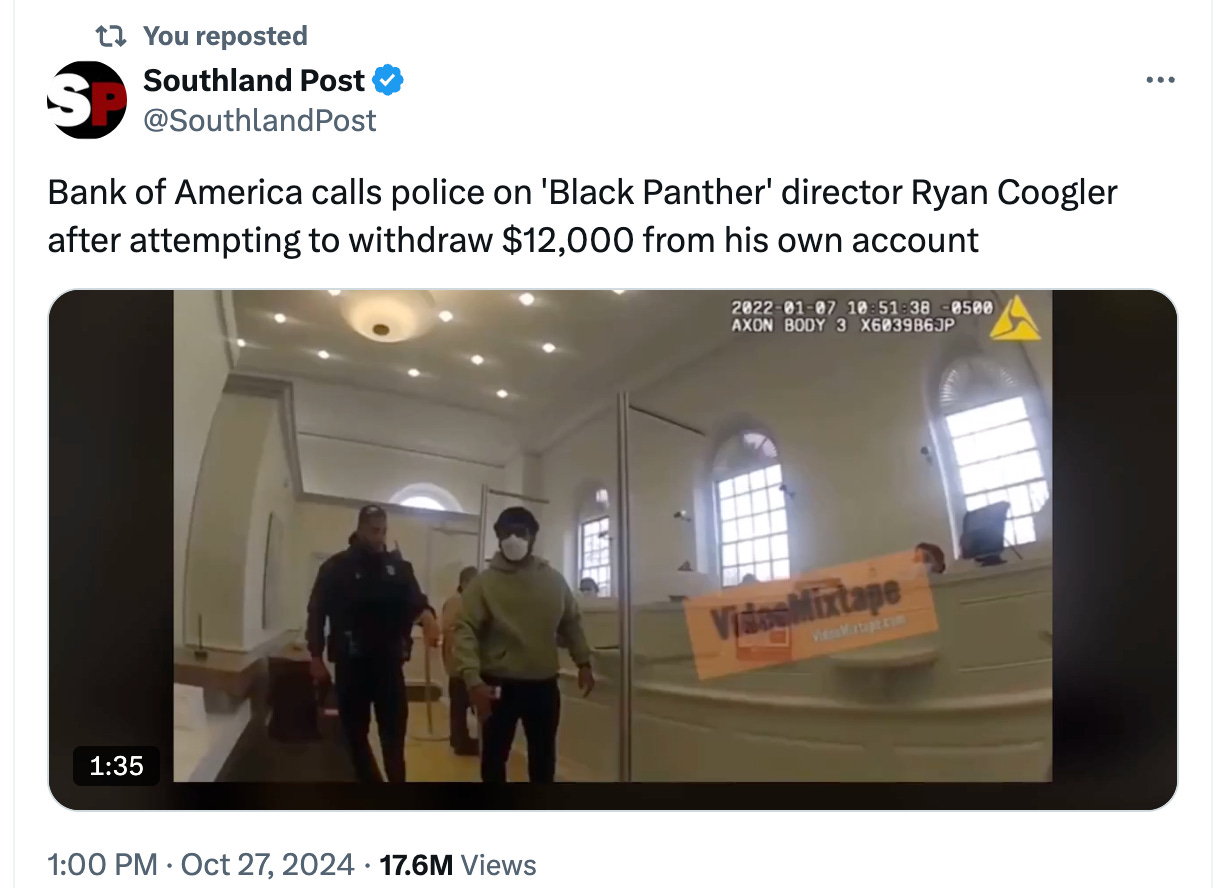Welcome to your weekly Dark Markets news roundup. This week, there’s a rare failed Trump fraud; How to Trick an LLM; and deeper research on Terra Luna and the history of … payphone scams?
Why World Liberty Financial Was a Bust for Trump
Probably the funniest joke I heard last week was that Donald Trump’s failed DeFi launch left him with no option but to return to his old job at McDonald’s. Many such cases.
$WLFI was unambiguously a catastrophe. 12 days after presales began, the team has sold only 5% of its $300m token presale target, as $WLFI reached for a pre-money valuation of $1.5 billion. I wish I could say this was some sort of indication that Trump’s profound appeal to the stupidest people on Earth has finally faded, but that silly valuation is just one of the much simpler reasons the launch failed.
Others include the fact that his developers were known scammers, the token was locked with no guarantee of future saleability (???Seriously?), and apparently the website crashed mid-sale.
A salutary reminder that, like most fascists, Donald Trump is an utter, bumbling catastrophe when he tries to do, well, pretty much anything.
$20m in Seized Bitfinex funds Hacked From U.S. Custody
This one is surreal. We recently saw Razzlekhan recommended for an 18 month sentence for her role in the BitFinex hack, but her loot was still being held by the U.S. rather than returned to BitFinex. Now $20 million of those funds have been stolen from the U.S. government in an apparent hack.
This is notable because, while Razzlekhan (Heather Morgan) and Ilya Lichtenstein were charged with laundering the Bitfinex funds, and were presumed to be involved in the hack itself, though noone has actually been charged with the initial theft. Veteran hackers have questioned whether Ilya was actually capable of the initial hack, so taken altogether, this latest wrinkle in the drama could be the real hacker getting a second bite at the apple.
Tether Under Possible Investigation
The Wall Street Journal reports that Tether, the massive offshore stablecoin issuer, is under criminal investigation for money laundering-related offenses. As the heads of Tether rightly point out, this is a bit odd, since they have been blocking and suspending accounts at the request of U.S. and other governments for years. Tether is not a “cryptocrrency” in the predominant sense: the tokens are tracked on a blockchain, but are backed by off-chain funds (held by Cantor Fitzgerald) and Tethers can be easily censored by the issuer.
Redditors are using Irony to Trick Data Scrapers
“Thinking LLMs are intelligent is proof of your own ignorance”, part one million:
London-based Redditors have begun intentionally spamming food subs with fake endorsements of an apparently either terrible or just gauche tourist trap called the Angus Steakhouse. With easily detectable irony, they’re waxing poetic that it’s the “perfect place for an influencer. Top notch beef from Angus, what a guy.”
Of course, any human of reasonable intelligence can tell what’s happening here, but not the LLMs that Google is using to construct its AI results. And indeed, according to Ars Technica, the Angus Steakhouse-related shitposts are starting to influence Google results.
Police Were Called on Ryan Coogler for Withdrawing Money from His Own Bank
Shocking video from a 2022 incident resurfaced on Twitter last week, and it’s worth absorbing. The Bank of America teller may have jumped to conclusions, apparently based on Coogler handing her a written note … along with appropriate ID.
But the real dingbats here were clearly the cops: According to a 2022 writeup from the New York Times, Coogler’s driver and passenger both told the police who he was before they entered the bank and then cuffed Coogler. BofA of course later apologized. Hopefully Coogler no longer banks there.
Further Reading
Buy Payphones and Retire
I’ve only just discovered the newsletter “Computers are Bad,” but based on both the name and this article about payphone investment pyramid schemes in the ‘90s, I would describe it as a “strong buy.”
The essence of the scam was that, after phone deregulation, private companies could set up their own payphones. Shady operators leveraged the opportunity to sell phones to investors who would collect the revenue. Except that in many cases, such as that of Atlanta’s Charles Edwards, the phones didn’t really exist, and the “investments” were actually going into a pyramid scheme. Great, great work here by j.b. crawford.
Anatomy of a Run: the Terra Luna Crash
Sweden’s central Riksbank has published a research report detailing the mechanics and circumstances of the Terra Luna blowup, by Jiageng Liu, Igor Makarov, and Antoinette Schoar, of MIT and the LSE. I obviously have a stake here, since my reporting helped expose the core flaws of the system, and this writeup seems very thorough, including citing reams of theoretical work on why the core mechanism of the UST stablecoin was a bad joke. At the very least, this is a great resource for its many citations of up-to-the minute academic finance research on stablecoins and other topics.
There’s also some genuine insight here - above all, that despite the transparency of the blockchain, sophisticated investors did much better on the Luna trade than average punters. In substance, that’s because clowns like Galaxy Digital’s Mike Novogratz knew that UST was a bomb waiting to go off, essentially lied about their enthusiasm for it, then sold their holdings before the plebs they’d dumped on got vaporized in the unwind.






"
A salutary reminder that, like most fascists, Donald Trump is an utter, bumbling catastrophe when he tries to do, well, pretty much anything.
"
So... What you are saying is you are left with catastrophe. Unless successful, then fascism.
Fuck.
"this latest wrinkle in the drama could be the real hacker getting a second bite at the apple."
That would be fairly fascinating, almost to the point of entertaining, if so. Can you imagine someone who, rather than go after another target, is so single mindedly focused on this biggest heist of their career, has the audacity to try to steal it again from the authorities after it was recaptured? The risk/reward being so out of whack, except for the personal gratification of the thief's ego. I guarantee there's a heist movie where this happens and the thief is far more attractive than whomever this would be in real life. If I ever have time for fiction again, that would make for a great plot and a great antagonist, maybe even anti-hero in a dystopian setting.
"As the heads of Tether rightly point out, this is a bit odd, since they have been blocking and suspending accounts at the request of U.S. and other governments for years."
Not odd in the least. Tether is being let off too lightly here. They and aforementioned Bitfinnex are thick as... Well you know... Hmm, dystopian anti-hero... Naw...
You got black boxes all around the world you can put questionable assets, including offshore commercial paper, in and get something that supposedly is worth a dollar. No one gets to see what's going in.
These black boxes also connect to a really big black box (all essentially controlled by the same people) that throws in all kinds of crypto and out comes (occasionally) other crypto. And no one knows if it's all there, because no one can see inside if it is, and none of the conversions are on chain. And no one can really know if this big black box, say, uses this obfuscation to manipulate the price of a certain orange coin that is then used for lending by the aforementioned boxes.
And all these black boxes are connected to other black boxes that connect to somewhat blackish boxes masquerading as banks that spit out real US Dollars, thus directly connecting them to our banking system (Signatures and their absolutely ridiculous list of black box transfer partners). These banks get regularly bailed out and have FDIC protection because they are /supposed/ to be very regulated, transparent, and risk averse, and tax payers pay for it all.
Every time some offshore commercial paper, and easily manipulated crypto assets, leads to banks spitting out real US Dollars, average people get screwed. No, anyone this close to on and off ramps should not get off so lightly just because they give largesse to the few morsels someone else discovers regarding yet someone else's malfeasance.
But, yay, impending catastrophes. So, yay, probably nothing will happen regarding this probe as our country will be burning down faster than Nero can fiddle.
"
But the real dingbats here were clearly the cops: According to a 2022 writeup from the New York Times, Coogler’s driver and passenger both told the police who he was before they entered the bank and then cuffed Coogler.
"
Huh, yeah, that is weirdly inept of... Oh, wait, director of "Black Panther" per the caption... Can't really tell by the picture, what does Google images say of this person... Oh. Yeah. That's why. Sad to see black boxes matter more than black lives.